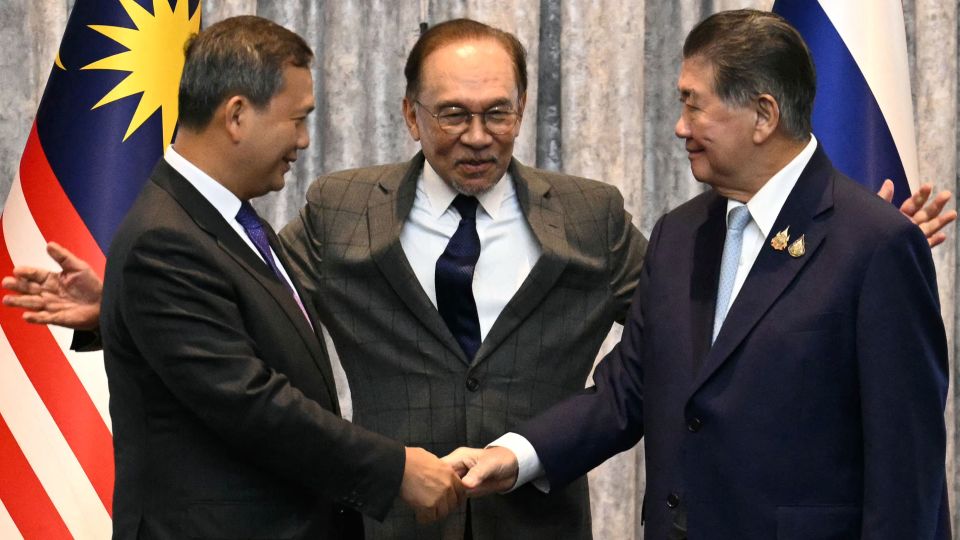Cambodia and Thailand have agreed to an “immediate and unconditional ceasefire” beginning at midnight local time (1 p.m. ET Monday), following days of clashes across the two countries’ disputed border.
The ceasefire was announced by Malaysian Prime Minister Anwar Ibrahim, the current chair of the Association of Southeast Asian Nations (ASEAN), who mediated talks between Cambodian Prime Minister Hun Manet and acting Thai Prime Minister Phumtham Wechayachai at his official residence near the capital Kuala Lumpur.
Both sides have accused the other of starting the latest border flare-up and traded blame for the ongoing fighting, which has killed at least 38 people and injured more than 200, according to figures from Thai and Cambodian officials. The dispute over their border goes back decades.
The leaders indicated in a joint news conference that fighting will stop immediately, even as clashes continued on Monday morning in the hours before the peace talks. Cambodian authorities accused Thailand of striking at least two locations in the early hours, while the Thai army said clashes were taking place in three provinces.
Thai residents who fled their homes following the cross-border clashes celebrate at an evacuation center in Surin province, Thailand, after hearing the announcement of an immediate and unconditional ceasefire on Monday. – Sakchai Lalit/AP
Reports of fighting dragged on even after the ceasefire was announced. The head of an evacuation shelter on the Cambodian side, Dr. Moun Nara, told CNN hours after the announcement: “I still hear the sound of the shooting… It’s not yet ended yet. Let’s wait and see until midnight.”
The United States and China also participated in the ceasefire negotiations.
US Secretary of State Marco Rubio applauded the ceasefire on Monday and said the Trump administration expects the two governments “to fully honor their commitments to end this conflict.” Rubio said earlier that State Department officials were on the ground in Malaysia to assist with the negotiations.
US President Donald Trump announced on Saturday that the Southeast Asian nations had agreed to ceasefire talks, but localized fighting continued throughout the weekend. Trump said he warned the Thai and Cambodian leaders that he would not make trade deals with either country if the deadly border conflict continued.
“This is an important step towards reducing tensions and restoring peace and security,” Hun Manet said in a statement confirming the ceasefire, in which he thanked the Malaysian prime minister, the Chinese government and Donald Trump specifically for their support in the negotiation process.
He also announced that the two countries will establish a Cambodian-Thai General Boundary Committee, which will hold an initial meeting on August 4, hosted by Cambodia.
“Today’s outcome reflects Thailand’s desire for a peaceful resolution, while continuing to protect our sovereignty and the lives of our people,” Phumtham said in the news conference. “We agreed to a ceasefire that will be carried out in good faith by both sides.”
Malaysia is prepared to deploy a team to “ensure implementation and observation” of the ceasefire, Ibrahim said, adding that both Thailand and Cambodia will resume direct communication at the level of prime ministers, foreign ministers and defense ministers.
Tensions rising since May
In recent decades, Thailand and Cambodia have had a complicated relationship of both cooperation and rivalry. The two countries share a 500-mile (800-kilometer) land border – largely mapped by the French when they controlled Cambodia as a colony – that has periodically seen military clashes.
Recent tension had been simmering since an encounter in May, in which a Cambodian soldier was killed.

A Cambodian soldier stands on a truck carrying a Russian-made BM-21 rocket launcher travelling along a street in Oddar Meanchey province on July 26, 2025. – Tang Chhin Sothy/AFP/Getty Images
Relations soured further following the release of a leaked phone call between Thai Prime Minister Paetongtarn Shinawatra and Cambodia’s Hun Sen, the father of the current prime minister. In the call, Paetongtarn could be heard calling Hun Sen “uncle” and appeared to criticize her own army’s actions in the border dispute, which led to her suspension after opponents accusing her of compromising the country’s interests.
The most recent flare-up came after five Thai soldiers were injured in a landmine explosion last week, with the incident prompting Thailand to downgrade diplomatic relations with its neighbor.
That was followed by days of deadly clashes and heavy weapons fire across their disputed border, displacing more than 139,000 people from seven provinces in Thailand, and at least 80,000 people in Cambodia.
Thailand on Monday said 25 people have been killed since hostilities began, 14 of whom are civilians.
Cambodian authorities previously said that in Oddar Meanchey province, which borders Thailand’s Surin, 13 people had been killed, including eight civilians, and 50 wounded.
CNN’s Helen Regan, Lex Harvey, Jonny Hallam and Jennifer Hansler contributed to this report.
For more CNN news and newsletters create an account at CNN.com

